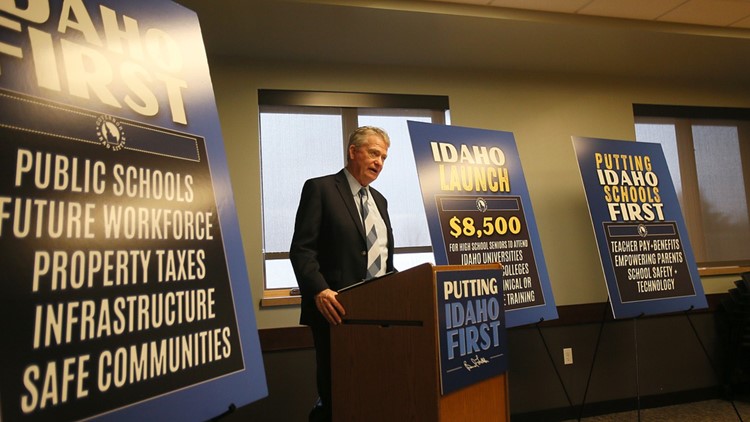POST FALLS, Idaho — High school seniors who graduate in 2024 and plan to invest in higher education in Idaho will feel that investment come right back to them, as reported by KREM 2 News partner the Coeur d'Alene/Post Falls Press.
Through Gov. Brad Little's Idaho Launch scholarships, those grads will have access to $8,500 they won't have to repay to spend on continuing their education in Idaho universities, community colleges, career technical paths or workforce training.
"This’ll be the biggest investment ever in grants for graduating seniors to go on and either get their four-year degree, their associate’s degree or a career technical certification," Little said Friday during a visit to the Idaho Department of Labor offices in Post Falls. "We’re very excited about that."
He said career technical facilities are among the beneficiaries of this initiative. He said he would like to see increases in higher education enrollment, and that the Idaho Launch scholarships should help that.
"It's really helpful for the community colleges," Little said. "That $8,500 will go a long way. If you're not spending too much money, $8,500 will get you an associate's degree."
Education, the fentanyl epidemic, surplus funds and property taxes were among topics Little discussed as he presented his 2023 legislative priorities.
Work will continue with Little's Operation Esto Perpetua, a strategy launched in spring 2022 to combat Idaho's growing drug threat.
“We know there’s a lot of fentanyl traffic on this strip of interstate right through here,” Little said, gesturing through the window at Interstate 90.
"We sent some of our drug interdiction people down to the border to learn about what we could do there to help with that," he said. "We’re going to send them again this year to learn more. We’re doing everything we can with the state police. We’re standing up a new drug interdiction task force in the state police and we’re increasing compensation for our state troopers."
While law enforcement knows all about fentanyl, Little said it's amazing how few people understand the magnitude and lethality of the drug.
"It's different from a lot of these other drugs," Little said. "Parents get caught absolutely flat footed. The law enforcement community, the medical community, the schools, it's just amazing about how deadly and how abundant and how cheap it is."
Little said a property tax recommendation will go before the Idaho Legislature.
“This will basically be money for the general fund that will go in to augment property taxes to the tune of $120 million,” he said.
Generally, Little said, part of the problem is that all taxing districts are not the same, "whether it's school taxes, sewer or water, roads, community college and of course the state."
"We can make the rules from where it might shift from one property taxpayer to another, or shift the burden from property taxes to the general fund, which is your income taxes and sales taxes," he said.
He said he knows, especially in North Idaho, some of the funds will be used for school bonds.
“That’s somewhat dependent upon what the patrons of the school district decide up here, but that $120 million will be available to either reduce bonds or help with bonds," he said. "Those are all property tax obligations today."
He said what the state has done in the past few years and what is planned for this year is to lessen the cost to taxpayers for schools as well as infrastructure — sewer, water, roads and bridges.
Another item Little and his team are working on to enhance the safety of Idaho's communities focuses on behavioral health and better facilities to care for troubled youth.
"We really didn't have resources. The state of Idaho was sending them out of the state before," Little said. "Now we're going to have places to where we can help get these kids back on their feet, back with their families and back in their communities as soon as possible."
Regarding Idaho's financial state, another surplus is expected at the end of the year.
"We're the fastest-growing state for tax revenue," Little said. "The extra money coming in is coming in at a clip of about $2 extra, and we're not even spending $1 of it. That's why we keep having these surpluses — the state's doing well, the revenue's coming in and we're still keeping the budget numbers down."
Little touched on the November homicides of four University of Idaho students.
"It was all over the state," he said. "The magnitude of the tragedy is just hard and particularly, those three students that were from up here, it's indescribable."
He also commented on the ongoing news of accreditation concerns, infighting and dysfunction of the North Idaho College Board of Trustees.
"I think about, first, the students, then I think about the community," he said. "Community colleges have a big, big, big dose of local control."
He said he would love to see the controversy dial back and the focus to be on the students and NIC's workforce development. He asked what this kind of controversy says to students who are worried about accreditation and other factors that may interfere with their schooling.
"There are businesses here in this valley that are dependent upon workforce training that comes out of NIC. They've done some really unique and very, very progressive workforce development," he said. "It's not good when you have this much controversy."
The Coeur d'Alene Press is a KREM 2 News partner. For more from our news partner, click here.



